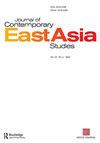The Belt and Road Initiative as continuity in Chinese foreign policy
IF 1.4
Q1 AREA STUDIES
引用次数: 7
Abstract
ABSTRACT The emergence of China as a major power has been accompanied by an unprecedented level of external activism, concretized in several regional and transcontinental projects among which the Belt and Road Initiative (BRI) is the most comprehensive one. This article aims to assess the contribution of previous foreign policy initiatives to the BRI, and to evaluate potential implications for Chinese strategic autonomy. It argues that while the Chinese-led initiative based on increasing interdependence and connectivity has a high potential to contribute to common development and regional integration, it also presents some destabilizing risks. The cooperation patterns promoted within the BRI strengthen Chinese strategic autonomy by enhancing its key positions along networks of capital and infrastructure around the world, foster asymmetric partnerships, maximize its influence and consolidate its control over land routes from Central Asia to Europe and the SLOC beyond the South China Sea. In discussing the implications raised by these aspects the article contends that in the long term, the BRI offers China significant opportunities to shape geo-economic landscape and the security architecture.“一带一路”倡议是中国外交政策的延续
摘要中国作为一个大国的崛起伴随着前所未有的外部行动主义,具体体现在几个区域和跨洲项目中,其中“一带一路”倡议倡议(BRI)是最全面的一个。本文旨在评估以往外交政策举措对“一带一路”倡议的贡献,并评估其对中国战略自主的潜在影响。报告认为,尽管中国领导的基于日益相互依存和互联互通的倡议有很大潜力促进共同发展和区域一体化,但也存在一些破坏稳定的风险。“一带一路”倡议中倡导的合作模式通过加强中国在世界各地资本和基础设施网络中的关键地位、促进不对称伙伴关系、最大限度地扩大其影响力以及巩固其对中亚至欧洲陆路和南中国海以外SLOC的控制,加强了中国的战略自主性。在讨论这些方面的影响时,文章认为,从长远来看,“一带一路”倡议为中国塑造地缘经济格局和安全架构提供了重要机遇。
本文章由计算机程序翻译,如有差异,请以英文原文为准。
求助全文
约1分钟内获得全文
求助全文
来源期刊

Journal of Contemporary East Asia Studies
Social Sciences-Cultural Studies
CiteScore
2.50
自引率
0.00%
发文量
10
审稿时长
6 weeks
 求助内容:
求助内容: 应助结果提醒方式:
应助结果提醒方式:


